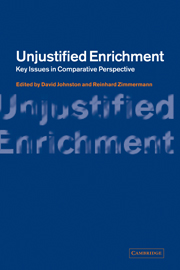Book contents
- Frontmatter
- Contents
- List of contributors
- Preface
- Table of cases
- List of abbreviations
- I Introduction
- II Enrichment ‘without legal ground’ or unjust factor approach
- 2 Unjust factors and legal grounds
- 3 In defence of unjust factors
- III Failure of consideration
- IV Duress and fraud
- V Change of position
- VI Illegality
- VII Encroachment and restitution for wrongs
- VIII Improvements
- IX Discharge of another person's debt
- X Third-party enrichment
- XI Proprietary issues
- XII Taxonomy
- Index
3 - In defence of unjust factors
Published online by Cambridge University Press: 31 July 2009
- Frontmatter
- Contents
- List of contributors
- Preface
- Table of cases
- List of abbreviations
- I Introduction
- II Enrichment ‘without legal ground’ or unjust factor approach
- 2 Unjust factors and legal grounds
- 3 In defence of unjust factors
- III Failure of consideration
- IV Duress and fraud
- V Change of position
- VI Illegality
- VII Encroachment and restitution for wrongs
- VIII Improvements
- IX Discharge of another person's debt
- X Third-party enrichment
- XI Proprietary issues
- XII Taxonomy
- Index
Summary
Introduction
The English law of unjust enrichment has always insisted that a claimant asking for restitution must show that there is a good reason why restitution should be available to him. It has differed from its more ancient Continental counterparts in that the ground for restitution was not an abstraction like ‘lack of juridical reason for the enrichment’, but a pragmatic, positive requirement or ‘unjust factor’, as Peter Birks has called it.
One question that lies at the heart of the recent swaps litigation is whether there can be restitution in English law for the mere reason that money was paid pursuant to a contract which has subsequently turned out to be void. If this question is answered in the affirmative, it will mean that the English law of unjust enrichment has come close to adopting the civil-law condictio indebiti – the claim to restitution on the basis that money was paid which was not due. In this chapter, it is argued that that would be the beginning of the end of the system of ‘unjust factors’. The English law of unjust enrichment would move considerably closer to civilian legal systems.
Before the question can be faced, it is necessary to look very briefly at the two different approaches. The leading textbook in comparative law, Konrad Zweigert and Hein Kötz's An Introduction to Comparative Law, identifies ‘the entrenched position of the institution of unjustified enrichment’ as one of the distinctive features of German law.
- Type
- Chapter
- Information
- Unjustified EnrichmentKey Issues in Comparative Perspective, pp. 76 - 100Publisher: Cambridge University PressPrint publication year: 2002
- 3
- Cited by



